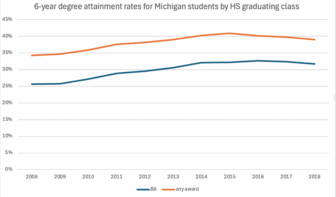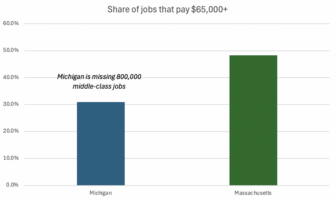A recent comment from Jeffery questioned the value of four-year degrees for all. This is a frequent question I get in my presentations. So I thought it worth doing a blog, rather than just responding to the comment.
Since we are interested in how to rebuild a high prosperity Michigan, our focus is on what is most important to the state’s economic well being. There the value of individuals with four-year degrees is very high. The places across the country with the highest proportion of adults with four-year degrees are the most prosperous. Michigan’s fundamental problem is that we are thirty fourth in college attainment.
We have never argued that everyone needs a four-year degree. In the states with high college attainment and high incomes the proportion with a four-year degree is in the mid thirties. So for states and regions the more four-year degreed adults you have the more prosperous you are.
For individuals a four-year degree is the best, but not the only, path to a good paying job/career. Our best guess is that the labor market a decade from now will require about 30-35% of workers to have a four-year degree or more and another 25-30% with the equivalent of an occupational certificate or associates degree from a community college. So about 40% of the jobs will be lower skilled. But what is different now is that almost all of them will be low paid.
The link Jeffery provided to the high demand jobs includes many low skill, low pay jobs. We certainly should help individuals get the skills needed to get those jobs. Any job is better than no job.
But the larger policy goal for the state should be to prepare, retain and attract talent so that we can recreate a high prosperity Michigan. And to have a lifelong education system that helps everyone develop the skills needed to get good-paying jobs and careers.






